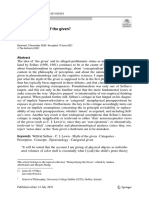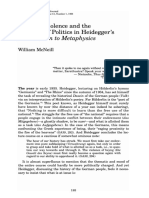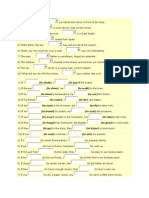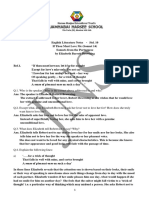Heidegger's Path To The Question of Being
Heidegger's Path To The Question of Being
Uploaded by
Duván Duque VargasCopyright:
Available Formats
Heidegger's Path To The Question of Being
Heidegger's Path To The Question of Being
Uploaded by
Duván Duque VargasOriginal Description:
Original Title
Copyright
Available Formats
Share this document
Did you find this document useful?
Is this content inappropriate?
Copyright:
Available Formats
Heidegger's Path To The Question of Being
Heidegger's Path To The Question of Being
Uploaded by
Duván Duque VargasCopyright:
Available Formats
Duvan Duque Vargas Contemporary Continental Philosophy
Topic 6
Heideggers path to the question of Being
Do we today have an answer to the question of what we properly mean by the word being? By
no means. And so it is fitting that we raise anew the question of the meaning of Being. But are we
today perplexed because we cannot understand the expression Being? By no means. And so we
must first of all awaken an understanding of the meaning of this question.
1
Heideggers first words in Being and Time explain what his intention is not only in that
particular work but in his whole career. His body of work is a continuous attempt to answer the
question about the meaning of Being. The way he proposes to recover that forgotten question and
think about Being is clearly outlined by him from the beginning. First of all, to get a better
understanding of Being, we must do an existential analysis, following the phenomenological
method, of that kind of being for which Being is an issue: Dasein. We must follow this analysis
with a destruction of that history of thought that has forgotten about Being in order to recover the
meaning of Being that that history has forgotten. Finally, after this destruction, a new way of
thinking, one that can think Being in a more primordial way, must follow. Analytic of Dasein,
destruction of the history of western metaphysics, and thinking after the end of philosophy: such
are the three major stages of Heideggers thought.
To begin with his inquiry on the question of the meaning of Being Heidegger points to
the necessity of asking that particular question. The meaning of Being may seem like something
evident. After all, western thought, from ancient ontology to the modern positive sciences, has
investigated different kinds of beings for centuries. However, do we really know what we mean
when we say that something is? The investigation of particular beings has not asked for that
1
Martin Heidegger, Being and Time: Introduction, Basic Writings, ed. by David Farrel Krell, p. 40.
which makes those beings be. Being in general is as universal as obscure and fundamental. The
fact that this obscurity may seem self-evident to us does not only makes the recovery of the
question a necessary task but also gives us an idea of where to start the inquiry.
Heidegger decides first to identify that particular being that has a priority access to Being.
He finds it precisely in that being that is inquiring, ourselves, or how he calls it, Dasein. The
priority of Dasein comes from the fact that its way of being is existence, which cannot be
specified by a material content because its essence lies rather in the fact that it has always to be
its Being as its own
2
. Dasein decides constantly its own being, projects a certain way of being
into the future and realizes it through its actions. Dasein chooses to be a writer, an athlete, a
lover, a mother. It also chooses to study, use, or play with certain kinds of beings. Even more,
under anxiety Dasein asks the fundamental question: why is there something rather than
nothing?
3
How can Dasein do this? How can Being be an ontic issue for Dasein if, as we have
seen, Dasein doesnt think Being as an available concept? The only possibility is that Dasein has
a kind of understanding of Being that is neither ontic nor ontological but pre-ontological. This
pre-ontological understanding of Being that distinguishes Dasein from all other beings in an
ontic level makes its analysis and revelation of its fundamental structures necessary to the
question of Being.
The analysis of Dasein performed in Being and Time reveals that Dasein understands
Being in terms of temporality. Dasein understands its Being and its future possibilities of Being
through an interpretation of its past. Such importance of temporality for Being has two main
consequences. Being has to be thought in different terms from those that the tradition had
thought about beings. Time cannot be the nave criterion to distinguish temporal from
2
Martin Heidegger, Basic Writings, ed. by David Farrel Krell, p. 54.
3
M. Heidegger, An Introduction to Metaphysics, Yale University Press, pp. 7-8.
atemporal or supratemporal beings. This unquestioned ontological function of time to distinguish
and rank regions of Being is responsible, according to Being and Time, for the problems of
ontology. An elaboration of the temporality of Being is key to the development of fundamental
ontology.
The second consequence is that, given the historicity of Daseins being, consequence of
its temporality, and given that the historical understanding of Being regulates Daseins
understanding of Being, a destructuring of the history of ontology is necessary in order to think
being in a different way. Even though Heidegger seems to abandon temporality as the fundament
of his ontology in later writings, this destructuring of western metaphysics, which from Greek
ontology to medieval and modern metaphysics have been concerned for distinctive domains of
Being without questioning their own Being, and as such have been charged of unexplained
concepts and presuppositions, takes a considerable amount of his work (Heidegger has it in mind
from the beginning of his writings, and it is precisely to prevent himself from falling in the same
concepts and prejudices of the tradition that he follows the phenomenological method in his
analysis and tries to distance his language from the one of the tradition). His intention is to
recover the forgotten question of Being, guided by the original experiences of Being of the
presocratics.
Both Heideggers phenomenological analysis and destructuring of western metaphysics
share precisely a concept that he recovers from the presocratics: aletheia. This early notion of
truth differs from truth as correspondence or correctness (as later developed by western thought).
Aletheia is truth as unconcealment, as disclosedness of Being, as what is present in presencing.
Heidegger relates this notion of aletheia to the phenomenological statement of to the things
themselves. Hes especially interested in the relation between what is concealed in the
unconcealment, what is absent in what is present, and the early Greek experience of letting
things show themselves in their unlimited disclosure.
However, since Plato and Aristotle the concealment of Being has been forgotten. With
the birth and development of western metaphysics a fixed way of Being is imposed to beings,
including mans own being and his relation to fixed objects. Man forgets the mystery of Being
and fills out a world according to its own needs, taking the result as standard and replenishing the
standards when exhausted, finally taking its subjectivity as standard for all beings, molding
beings through science in a technological world. Such thought has run its history; it has
exhausted the different ways in which being could be thought in such way. The nihilism of the
technological age with its decline of truth is, to Heidegger, the last step of metaphysics. In texts
such as Overcoming Metaphysics or The End of Philosophy and the Task of Thinking, Heidegger
describes and destructures this history from the classics to the medieval and the moderns
(including Descartes, Kant, Hegel, and Nietzsche or Marx as the last step).
The remembering of the question about Being is the recovery of aletheia and the
necessary notion of concealment that accompanies it. The disclosure of beings as such is
simultaneously and intrinsically the concealing of being as a whole
4
. Thinking after the
destructuring of metaphysics requires an acknowledgement of the concealment, and thus cannot
continue using the same categories and methods of that thought that instead of recognizing the
concealment inherent to truth imposed an artificial stability and rigidness on beings. The new
thought must also recognize the hermeneutic circle, the interpretative nature of Dasein which its
analytic revealed, the fact that in every questioning of beings Dasein presupposes a certain
unconcealment of Being, rendering the complete revelation of Being as a whole an impossible
task. He constantly returns to such circle in his writings on different subjects (such as modern
4
Martin Heidegger, On the Essence of Truth, Basic Writings, p. 134.
science, art or truth). This impossibility to step out of the circle is not a negative one: In the
circle is hidden a positive possibility of the most primordial kind of knowing.
5
As Heidegger
puts it, we must rather endeavor to leap into the circle, primordially and wholly
6
.
In his later writings Heidegger is interested precisely in this task of thinking that is left
after the exhaustion of western metaphysics and their realization in modern sciences, a thinking
that can be neither metaphysics nor science
7
. He proposes a return to the early greek experience,
a return to aletheia (which he now refers to as unconcealment thought as the clearing of
presence
8
). He talks of this task as meditative thinking, as releasement towards things, as
waiting for the unconcealment. This task remains open to the mystery of what is concealed in
unconcealment. In this quest, his language separates itself more and more from the traditional
language of philosophy and calculative thinking to get closer to the language of poetry, a
language that is, perhaps, more adequate to talk of Being without ignoring its inherent
concealment.
Heideggers answer to the question about the meaning of Being is not a definite end to
the question. More than a definite answer, he offers a path. Has he failed in his quest? Has all of
his work been useless? In no way. His work precisely shows the impossibility of giving a
definite answer, and in doing so it rediscovered the wonder of Being, bringing back the notion of
concealment and the fact that every question, including the question about the meaning of Being,
presupposes an answer. Every experience of Being is shaped by a presupposed meaning of
Being. Heidegger puts meaning in the center of human experience.
5
Martin Heidegger, Being and Time, p. 194.
6
Martin Heidegger, Being and Time, p. 363.
7
Martin Heidegger, The End of Philosophy and the Task of Thinking, Basic Writings, p. 436.
8
Martin Heidegger, The End of Philosophy and the Task of Thinking, Basic Writings, p. 446.
Bibliography
M. Heidegger, An Introduction to Metaphysics, Yale University Press.
Martin Heidegger, Basic Writings, ed. by David Farrel Krell, 2008, New York, HarperCollins.
Martin Heidegger, Being and Time, (course PDF)
Martin Heidegger, Discourse on Thinking, 1966, new York, Harper & Row.
You might also like
- Ewa Rajewska, Dwie Wiktoriańskie Chwile W Troi, Trzy Strategie TranslatorskieDocument100 pagesEwa Rajewska, Dwie Wiktoriańskie Chwile W Troi, Trzy Strategie TranslatorskieEwaNo ratings yet
- Biag Ni Lam AngDocument31 pagesBiag Ni Lam AngBONNA FAYE CHRISZEL HUI YING TAN100% (1)
- Martin Heidegger: The Question of Being: Key WordsDocument8 pagesMartin Heidegger: The Question of Being: Key Wordsfelipe oyarzunNo ratings yet
- Austrian Philosophy The Legacy of Brentano PDFDocument376 pagesAustrian Philosophy The Legacy of Brentano PDFJUNIOR PIRES100% (1)
- Moravcsic-Appearance and Reality in Heraclitus' PhilosophyDocument18 pagesMoravcsic-Appearance and Reality in Heraclitus' PhilosophyМарина ВольфNo ratings yet
- Hiberno EnglishDocument20 pagesHiberno EnglishAhmed SharifNo ratings yet
- Old English Se. From Demonstrative To ArticleDocument371 pagesOld English Se. From Demonstrative To ArticleAlejandro RujanoNo ratings yet
- Heidegger and DescartesDocument10 pagesHeidegger and DescartesCharleston SouzaNo ratings yet
- Alawa - Heidegger and Hegel On Being PDFDocument5 pagesAlawa - Heidegger and Hegel On Being PDFFélixFernándezPalacioNo ratings yet
- Hegel and HeideggerDocument38 pagesHegel and HeideggerAgrimaNo ratings yet
- Joseph J Omalley Hegel and The History of Philosophy Proceedings of The 1972 Hegel Society of America Conference 1Document249 pagesJoseph J Omalley Hegel and The History of Philosophy Proceedings of The 1972 Hegel Society of America Conference 1karolajn.ops100% (1)
- Houlgate Kant Nietzsche and The Thing ItselfDocument43 pagesHoulgate Kant Nietzsche and The Thing ItselfLospa Stocazzo100% (1)
- The Feeling of BeingDocument19 pagesThe Feeling of BeingAsnaafii BantiiNo ratings yet
- Subjectivity in Descartes and KantDocument17 pagesSubjectivity in Descartes and KantKch StrummerNo ratings yet
- Heidegger HegelDocument21 pagesHeidegger HegelkadirfilizNo ratings yet
- Internet Encyclopedia of PhilosophyDocument23 pagesInternet Encyclopedia of PhilosophyAnonymous KZvKZMej4KNo ratings yet
- OShea - What Is The Myth of The GivenDocument25 pagesOShea - What Is The Myth of The GivenTiegue Vieira RodriguesNo ratings yet
- A Leftist Confronts Fascism - Gentilean Revolt Against NatureDocument26 pagesA Leftist Confronts Fascism - Gentilean Revolt Against NatureHugãoNo ratings yet
- Freud and His CriticsDocument139 pagesFreud and His CriticsDharam DeepNo ratings yet
- Heidegger's Concept of Temporality Reflections of A Recent CriticismDocument22 pagesHeidegger's Concept of Temporality Reflections of A Recent Criticismaseman1389No ratings yet
- Existential Struggles in Dostoevsky's The Brothers KaramazovDocument21 pagesExistential Struggles in Dostoevsky's The Brothers KaramazovSashikant ModiNo ratings yet
- Taminiaux - The Platonic Roots of Heidegger's Political Thought PDFDocument19 pagesTaminiaux - The Platonic Roots of Heidegger's Political Thought PDFSardanapal ben EsarhaddonNo ratings yet
- Glossary-Heidegger Being and TimeDocument47 pagesGlossary-Heidegger Being and TimeAljean PardinasNo ratings yet
- SARTRE The Cambridge Dictionary of Philosophy Second EditionDocument2 pagesSARTRE The Cambridge Dictionary of Philosophy Second EditionThais De Sa Oliveira0% (1)
- Hyppolite, Studies On Marx and HegelDocument224 pagesHyppolite, Studies On Marx and HegelLada LaikaNo ratings yet
- Williams - Ryle, Heidegger and The Ways of ThinkingDocument11 pagesWilliams - Ryle, Heidegger and The Ways of Thinkinggravitys12No ratings yet
- History and Roots of Gestalt Therapy TheDocument10 pagesHistory and Roots of Gestalt Therapy TheobchodxNo ratings yet
- Shapes of History and The Enigmatic Hero RaskolnikovDocument20 pagesShapes of History and The Enigmatic Hero RaskolnikovAlejandra FigueroaNo ratings yet
- Sisyphus and The Rolling StoneDocument11 pagesSisyphus and The Rolling StoneVincent MulderNo ratings yet
- The Problems of The Philosophy of History An Epistemological Essay (Georg Simmel) (Z-Library)Document237 pagesThe Problems of The Philosophy of History An Epistemological Essay (Georg Simmel) (Z-Library)ShhhNo ratings yet
- Crooks, James - Getting Over Nihilism. Nietzsche, Heidegger and The Appropriation of TragedyDocument15 pagesCrooks, James - Getting Over Nihilism. Nietzsche, Heidegger and The Appropriation of TragedypatriamilitanteNo ratings yet
- Dossier Canguillhem and BachelardDocument232 pagesDossier Canguillhem and BachelardOlga NancyNo ratings yet
- Alanen - Descartes's Concept of MindDocument374 pagesAlanen - Descartes's Concept of MindBach45No ratings yet
- Introduction To Existentialism (First Published As 'Dreadful Freedom') (1984)Document160 pagesIntroduction To Existentialism (First Published As 'Dreadful Freedom') (1984)Lukas KahnNo ratings yet
- Naddaf, What Is Presocratic Philosophy? (2006)Document19 pagesNaddaf, What Is Presocratic Philosophy? (2006)Keith HurtNo ratings yet
- Richard Wolin - Heidegger in Ruins - Between Philosophy and Ideology-Yale University Press (2023)Document487 pagesRichard Wolin - Heidegger in Ruins - Between Philosophy and Ideology-Yale University Press (2023)Fernando DannerNo ratings yet
- Gestalt Theory - The Insight Learning - Dr. V.K. Maheshwari, PH.DDocument13 pagesGestalt Theory - The Insight Learning - Dr. V.K. Maheshwari, PH.DJayanth MamundiNo ratings yet
- Flynn - Sartre, Foucault and The CritiqueDocument20 pagesFlynn - Sartre, Foucault and The CritiqueAlvaroNo ratings yet
- Existental Philosophy PDFDocument28 pagesExistental Philosophy PDFValentina CizmarNo ratings yet
- Long - Greek Models of Mind and Self-Harvard University Press (2015)Document248 pagesLong - Greek Models of Mind and Self-Harvard University Press (2015)Cristóbal MorenoNo ratings yet
- Searle Campus WarDocument17 pagesSearle Campus WarblassmausNo ratings yet
- Dreyfus OVERCOMING THE MYTH OF THE MENTAL How PHILOSOPHERS CAN PROFIT FROM THE PHENOMENOLOGY OF EVERYDAY EXPERTISEDocument20 pagesDreyfus OVERCOMING THE MYTH OF THE MENTAL How PHILOSOPHERS CAN PROFIT FROM THE PHENOMENOLOGY OF EVERYDAY EXPERTISEAndrei PredaNo ratings yet
- Hegel or SchellingDocument9 pagesHegel or SchellingEduardo CharpenelNo ratings yet
- Dreyfus The Primacy of Phenomenology Over Logical AnalysisDocument38 pagesDreyfus The Primacy of Phenomenology Over Logical Analysisassnapkin4100% (1)
- Jean-Paul Sartre S Notebooks For An EthiDocument13 pagesJean-Paul Sartre S Notebooks For An EthiTapu ManaNo ratings yet
- Historical Development of Speculative Philosophy - Kant To HegelDocument454 pagesHistorical Development of Speculative Philosophy - Kant To HegelAntónio Azevedo100% (1)
- PHIL210-6 Fall2023 Syllabus-1Document9 pagesPHIL210-6 Fall2023 Syllabus-1killergenius369No ratings yet
- Kierkegaard and PhenomenologyDocument27 pagesKierkegaard and PhenomenologyVladimir CârlanNo ratings yet
- ART - Deleuze and Cadiot On Robinson Crusoe and CapitalismDocument15 pagesART - Deleuze and Cadiot On Robinson Crusoe and CapitalismMatiasBarrios86No ratings yet
- On BrentanoDocument99 pagesOn BrentanoAnonymous LnTsz7cp100% (1)
- McNeill HeideggerDocument30 pagesMcNeill HeideggerweltfremdheitNo ratings yet
- Eileen Rizo-Patron BachelardDocument16 pagesEileen Rizo-Patron BachelardGabriel Kafure da RochaNo ratings yet
- Phenomenology of DesireDocument4 pagesPhenomenology of DesireMark LeonardNo ratings yet
- Kant Transcendental IdealismDocument43 pagesKant Transcendental IdealismBbaggi Bk100% (1)
- Maurice Mandelbaum - Historical Explanation The Problem of 'Covering Laws'Document15 pagesMaurice Mandelbaum - Historical Explanation The Problem of 'Covering Laws'Kostas BizasNo ratings yet
- Alice Ormiston Love and Politics Re Interpreting Hegel State University of New York PressDocument175 pagesAlice Ormiston Love and Politics Re Interpreting Hegel State University of New York PressMinus SmileNo ratings yet
- Fichte's Conception of GodDocument12 pagesFichte's Conception of GodAWHOFNo ratings yet
- Bettina Bergo - Anxiety - A Philosophical HistoryDocument539 pagesBettina Bergo - Anxiety - A Philosophical HistoryWilhelm von Pelton100% (2)
- Philosophers Born in The Twentieth CenturyDocument60 pagesPhilosophers Born in The Twentieth CenturyRejane AraujoNo ratings yet
- Reclaiming the Enlightenment: Toward a Politics of Radical EngagementFrom EverandReclaiming the Enlightenment: Toward a Politics of Radical EngagementNo ratings yet
- Daiches DDocument7 pagesDaiches DSanjay DasNo ratings yet
- Copie de CLASSEUR PROSPECTION Imane SynthèseDocument35 pagesCopie de CLASSEUR PROSPECTION Imane Synthèsebouembassa.imaneNo ratings yet
- 2 - TW-304 - TrustDocument2 pages2 - TW-304 - TrustBible_lover_Bill100% (1)
- Aecc-II EngDocument4 pagesAecc-II EngMANIRAJ BAGNo ratings yet
- AssignmentDocument1 pageAssignmentsinghayush2200000No ratings yet
- 05 Builder InstrManual SPD Easy PrintDocument30 pages05 Builder InstrManual SPD Easy PrintBagian BarangNo ratings yet
- IGNOU Re-Registration Payment Receipt 2024Document1 pageIGNOU Re-Registration Payment Receipt 2024piratedlife005No ratings yet
- Scientific Unknowables of The BibleDocument11 pagesScientific Unknowables of The BibleAlan BrooksNo ratings yet
- Session 1 McHale What Was PostmodernismDocument18 pagesSession 1 McHale What Was PostmodernismCan Rudy SolakogluNo ratings yet
- Thomas Merton, Asian Journal, 1973 (Ed Naomi Burton Et Al)Document15 pagesThomas Merton, Asian Journal, 1973 (Ed Naomi Burton Et Al)DrBertram ForerNo ratings yet
- Literature Review EpistemologyDocument9 pagesLiterature Review Epistemologyc5qxzdj7100% (1)
- Film Studies Syllabus NyuDocument8 pagesFilm Studies Syllabus Nyushrutarsi67% (3)
- Edward MacDowell by Gilman, LawrenceDocument82 pagesEdward MacDowell by Gilman, LawrenceGutenberg.orgNo ratings yet
- Rancière: The Emancipated SpectatorDocument8 pagesRancière: The Emancipated SpectatorRafael C. GardónNo ratings yet
- English PDFDocument5 pagesEnglish PDFSumit UpadhyayNo ratings yet
- A Room of One Owns by Virgina WoolfDocument2 pagesA Room of One Owns by Virgina WoolfAbsar SiddiquiNo ratings yet
- New GrammarDocument16 pagesNew Grammarsanand11No ratings yet
- The ChosenDocument2 pagesThe ChosenBigFriendlyKittyCatNo ratings yet
- IF THOU MUST LOVE ME (Question and Answer PDF)Document4 pagesIF THOU MUST LOVE ME (Question and Answer PDF)Vedashree Bane67% (3)
- Shumeruli Poezia Sruli PDFDocument300 pagesShumeruli Poezia Sruli PDFანა არაბულიNo ratings yet
- Gantt ChartDocument1 pageGantt ChartCamii MartinezNo ratings yet
- LiteratureDocument10 pagesLiteratureCarla VirtucioNo ratings yet
- Verbos IrregularesDocument31 pagesVerbos IrregularesUriel CortazarNo ratings yet
- Thesis For ScribdDocument111 pagesThesis For Scribdanne100% (4)
- What Is "The Lottery" Really About? Informational TextDocument2 pagesWhat Is "The Lottery" Really About? Informational TextJUAN SANCHEZ VAZQUEZNo ratings yet
- Masculine TheoryDocument14 pagesMasculine TheoryAristya EkaputraNo ratings yet

























































































